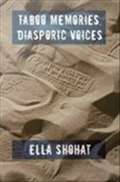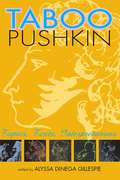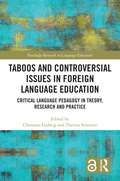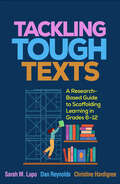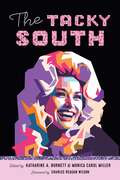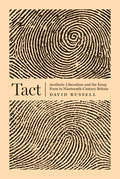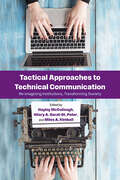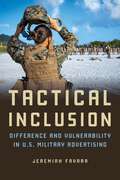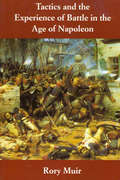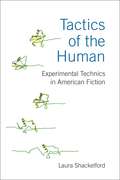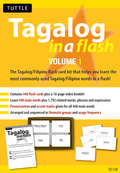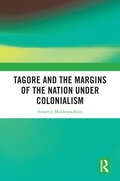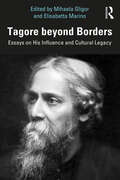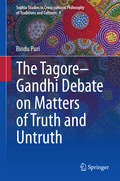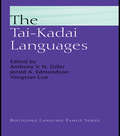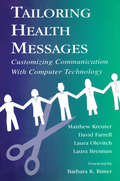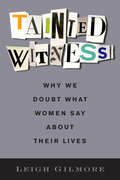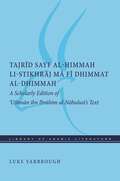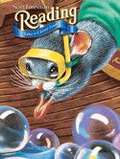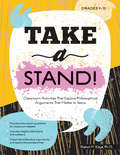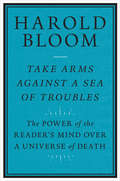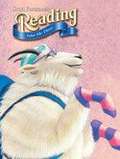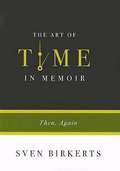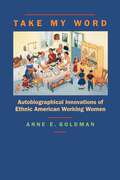- Table View
- List View
Taboo Memories, Diasporic Voices
by Ella ShohatTaboo Memories, Diasporic Voices brings together for the first time a selection of trailblazing essays by Ella Shohat, an internationally renowned theorist of postcolonial and cultural studies of Iraqi-Jewish background. Written over the past two decades, these twelve essays--some classic, some less known, some new--trace a powerful intellectual trajectory as Shohat rigorously teases out the consequences of a deep critique of Eurocentric epistemology, whether to rethink feminism through race, nationalism through ethnicity, or colonialism through sexuality. Shohat's critical method boldly transcends disciplinary and geographical boundaries. She explores such issues as the relations between ethnic studies and area studies, the paradoxical repercussions for audio-visual media of the "graven images" taboo, the allegorization of race through the refiguring of Cleopatra, the allure of imperial popular culture, and the gender politics of medical technologies. She also examines the resistant poetics of exile and displacement; the staging of historical memory through the commemorations of the two 1492s, the anomalies of the "national" in Zionist discourse, the implications of the hyphen in the concept "Arab-Jew," and the translation of the debates on orientalism and postcolonialism across geographies. Taboo Memories, Diasporic Voices not only illuminates many of the concerns that have animated the study of cultural politics over the past two decades; it also points toward new scholarly possibilities.
Taboo Pushkin
by Stephen G. SappSince his death in 1837, Alexander Pushkin—often called the “father of Russian literature”—has become a timeless embodiment of Russian national identity, adopted for diverse ideological purposes and reinvented anew as a cultural icon in each historical era (tsarist, Soviet, and post-Soviet). His elevation to mythic status, however, has led to the celebration of some of his writings and the shunning of others. Throughout the history of Pushkin studies, certain topics, texts, and interpretations have remained officially off-limits in Russia—taboos as prevalent in today’s Russia as ever before. Â Â Â The essays in this bold and authoritative volume use new approaches, overlooked archival materials, and fresh interpretations to investigate aspects of Pushkin’s biography and artistic legacy that have previously been suppressed or neglected. Taken together, the contributors strive to create a more fully realized Pushkin and demonstrate how potent a challenge the unofficial, taboo, alternative Pushkin has proven to be across the centuries for the Russian literary and political establishments.
Taboos and Controversial Issues in Foreign Language Education: Critical Language Pedagogy in Theory, Research and Practice (Routledge Research in Language Education)
by Christian LudwigThis edited volume provides innovative insights into how critical language pedagogy and taboo topics can inform and transform the teaching and learning of foreign languages. The book investigates the potential as well as the challenges involved in dealing with taboo topics in the foreign language classroom. Traditionally subsumed under the acronym PARSNIP (politics, alcohol, religion, narcotics, isms, and pork). By examining how additional controversial topics such as disability, racism, conspiracy theories and taboo language can be integrated into conceptual teaching frameworks and teaching practice, this edited volume draws on examples from literary texts and pop culture such as young adult novels, music videos, or rap songs and investigates their potential for developing critical literacies. The book considers foreign language teaching outside of English teaching contexts and sets the groundwork for addressing the integration of taboo topics in foreign language education theory, research, and practice. Filling an important gap in educational research, the book will be of great interest to researchers, academics, and students of foreign language education, critical pedagogy, and applied linguistics. It will also be useful reading for teacher trainers and educators of foreign language education.
Tackling Tough Texts: A Research-Based Guide to Scaffolding Learning in Grades 6–12
by Sarah M. Lupo Dan Reynolds Christine HardigreeFilling a crucial need, this book provides concrete ways to support all students in grades 6–12 as they engage with rigorous grade-level texts in English language arts, science, and social studies. The authors offer fresh insights into adolescent reading and what makes a given text "tough"--including knowledge demands, text structure and complexity, vocabulary, and more. Research-based, step-by-step strategies are presented for explicitly scaffolding these challenges in the context of purposeful learning activities that leverage students' individual strengths and interests. The book includes planning tips, text selection guidelines, sample text sets, and vivid case studies from culturally and linguistically diverse classrooms. Fourteen reproducible forms and handouts can be photocopied or downloaded for use with students.
The Tacky South (Southern Literary Studies)
by Scott RomineAs a way to comment on a person’s style or taste, the word “tacky” has distinctly southern origins, with its roots tracing back to the so-called “tackies” who tacked horses on South Carolina farms prior to the Civil War. The Tacky South presents eighteen fun, insightful essays that examine connections between tackiness and the American South, ranging from nineteenth-century local color fiction and the television series Murder, She Wrote to red velvet cake and the ubiquitous influence of Dolly Parton. Charting the gender, race, and class constructions at work in regional aesthetics, The Tacky South explores what shifting notions of tackiness reveal about US culture as a whole and the role that region plays in addressing national and global issues of culture and identity.
Tact: Aesthetic Liberalism and the Essay Form in Nineteenth-Century Britain
by David RussellThe social practice of tact was an invention of the nineteenth century, a period when Britain was witnessing unprecedented urbanization, industrialization, and population growth. In an era when more and more people lived more closely than ever before with people they knew less and less about, tact was a new mode of feeling one’s way with others in complex modern conditions. In this book, David Russell traces how the essay genre came to exemplify this sensuous new ethic and aesthetic.Russell argues that the essay form provided the resources for the performance of tact in this period and analyzes its techniques in the writings of Charles Lamb, John Stuart Mill, Matthew Arnold, George Eliot, and Walter Pater. He shows how their essays offer grounds for a claim about the relationship among art, education, and human freedom—an “aesthetic liberalism”—not encompassed by traditional political philosophy or in literary criticism. For these writers, tact is not about codes of politeness but about making an art of ordinary encounters with people and objects and evoking the fullest potential in each new encounter. Russell demonstrates how their essays serve as a model for a critical handling of the world that is open to surprises, and from which egalitarian demands for new relationships are made.Offering fresh approaches to thinking about criticism, sociability, politics, and art, Tact concludes by following a legacy of essayistic tact to the practice of British psychoanalysts like D. W. Winnicott and Marion Milner.
Tactical Approaches to Technical Communication: Reimagining Institutions, Transforming Society (SUNY series, Studies in Technical Communication)
by Hayley McCullough; Hilary A. Sarat-St. Peter; Miles A. KimballDelves into how individuals tactically exist within communicative systems, carving out spaces for themselves in places they don't necessarily fit.In 1984, Michel de Certeau described the terms "strategies" as how institutions communicate their wants/demands/desires and "tactics" as how individuals navigate these potentially hostile, unwelcoming systems. A little over two decades later, Miles A. Kimball solidified the idea of tactical technical communication, laying the foundations for a new area of inquiry and scholarship. Today, many academics and researchers have imbued the concept of tactical technical communication with their own ideas and perspectives. This essay collection spotlights a meaningful diversity of tactical technical communication scholarship, exploring topics like the feminist punk magazine BIKINI KILL, the phenomenon of copwatching, the usage of fictional narratives in technical writing courses, and the challenges of LBGTQ+ visibility in local libraries. In many ways, the contributors are partaking in their own forms of tactical communication as they carve out spaces for themselves and their ideas within the academic discourse.
Tactical Inclusion: Difference and Vulnerability in U.S. Military Advertising (Feminist Media Studies)
by Jeremiah FavaraThe revolution in military recruitment advertising to people of color and women played an essential role in making the US military one of the most diverse institutions in the United States. Starting at the dawn of the all-volunteer era, Jeremiah Favara illuminates the challenges at the heart of military inclusion by analyzing recruitment ads published in three commercial magazines: Sports Illustrated, Cosmopolitan, and Ebony. Favara draws on Black feminism, critical race theory, and queer of color critique to reveal how the military and advertisers affected change by deploying a set of strategies and practices called tactical inclusion. As Favara shows, tactical inclusion used representations of servicemembers in the new military to connect with people susceptible to recruiting efforts and rendered these new audiences vulnerable to, valuable to, and subject to state violence. Compelling and eye-opening, Tactical Inclusion combines original analysis with personal experience to chart advertising’s role in building the all-volunteer military.
Tactics and the Experience of Battle in the Age of Napoleon
by Rory MuirThis historical study of Napoleonic battles and tactics examines firsthand accounts from soldiers&’ memoirs, diaries, and letters: &“A major work&” (David Seymour, Military Illustrated). In this illuminating volume, historian Rory Muir explores what actually happened in battle during the Napoleonic Wars, putting special focus on how the participants&’ feelings and reactions influenced the outcome. Looking at the immediate dynamics of combat, Muir sheds new light on how Napoleon&’s tactics worked. This analysis is enhanced with vivid accounts of those who were there—the frightened foot soldier, the general in command, the young cavalry officer whose boils made it impossible to ride, and the smartly dressed aide-de-camp, tripped up by his voluminous pantaloons. Muir considers the interaction of artillery, infantry, and cavalry; the role of the general, subordinate commanders, staff officers, and aides; morale, esprit de corps, soldiers&’ attitudes toward death and feelings about the enemy; the plight of the wounded; the difficulty of surrendering; and the way victories were finally decided. He discusses the mechanics of musketry, artillery, and cavalry charges and shows how they influenced the morale, discipline, and resolution of the opposing armies. "Muir has filled an important gap in the study of the Napoleonic era."—Library Journal
Tactics Of The Human: Experimental Technics In American Fiction
by Laura ShackelfordTactics of the Human returns to American fiction published during the 1990s, formative years for digital cultures, to reconsider these narratives' comparative literary print methods of critically engaging with digital technologies and their now ubiquitous computation-based modes of circulation, scenes of writing, and social spaces. It finds that fiction by John Barth, Shelley Jackson, Leslie Marmon Silko, Ruth L. Ozeki, and Jeffrey Eugenides, by creatively transposing digital writing, material formats, and spatiotemporal orientations into print, registers shifting relations to technologies at multiple sites and scales. Grappling with the digital practices catalyzed by post-World War II biological, information, and systems theory, these literary narratives tactically enlist, and enable speculative diagnoses of, emerging relations to digital technologies. Their experimental technics comparatively retrace emerging relations to the digital as these impact American nationalisms and their transnational economic networks; processes of gendering and racialization that remain crucial to differential discourses of the human; and as they enter, unnoticed, into micropractices of everyday life and lived space. In the midst of expanding technoscientific processes of digital de- and re-materialization that render multiple, charged boundaries of the human increasingly plastic, Tactics of the Human illustrates why it is ever more crucial to query and assess the divergent (re)understandings of the human now categorized, quite loosely, as posthumanisms with particular attention to women's, subalterns', and other knowledges already considered liminal to the human. It identifies here and pursues strains of systems thinking, informed by feminist, new materialist, queer, and subaltern understandings of material practices, revealing why these are so pivotal to ongoing efforts to assess current limits to digital technics and expand upon their biological, cultural, social, and poetic potentialities.
Tagalog in a Flash Volume 1
by Edwin LimTagalog in a Flash: Volume I is an excellent new language learning resource for beginning students of Tagalog.Tagalog is the national language of the Philippines, and the beloved language of the second-largest Asian-American ethnic group.<P><P>With a full range of features to help beginners and intermediate learners, Tagalog in a Flash Volume 1 is an excellent learning tool for anyone who wants to master Tagalog (also known as Filipino). Containing 448 flash cards of the most commonly used Tagalog words and phrases, along with sample sentences, handy indexes and a guide to using the cards for most effective learning, Tagalog in a Flash Volume 1 delivers.Contains 448 flash cars plus a 16 page index booklet.Learn 448 main words plus 1,792 related words, phrases and expressions.Pronunciation and accent marks given for all 448 main words.Arranged and sequenced in thematic groups and usage frequency.
Tagore and the Margins of the Nation under Colonialism
by Amartya MukhopadhyayThis book focuses on India’s anti-colonial politics which Rabindranath Tagore (1861–1941) brought into the mainstream of nationalist thinking. It browses through the entire corpus of Tagore’s writings in the genres of poetry, fiction, and essays, to glean both used and hitherto unused/un-translated writings that illumine Tagore’s gender consciousness and (proto)feminist thought and empathy, presenting it in a wholly new light. It teases out Tagore’s original views on India’s industrial-capitalist development and his views on the roles of applied scientists and engineers in it to highlight his critique of the nature of science teaching in colonial India. The volume also delineates Tagore’s Upanişadic ecologism that creatively evoked anticolonialism and patriotism. Lucid and topical, the book will be indispensable for students and researchers in the fields of comparative literature, history, political science, international relations, and sociology at all levels, and anybody interested in literary criticism and cultural studies.
Tagore beyond Borders: Essays on His Influence and Cultural Legacy
by Mihaela Gligor Elisabetta MarinoThis book looks at Rabindranath Tagore’s creative art, social commitment, literary and artistic representation and his unique legacy in the cultural history of modern India – as a blend of the quintessentially Indian and the liberal universalist. Tagore’s genius, which he expressed through his poetry, songs, paintings, drama and philosophy, is celebrated across the globe. In 1913, he was awarded the Nobel Prize for Literature for his volume of poetry, Gitanjali (Song Offerings), making him the first Nobel laureate from Asia. This volume of essays celebrates his intellectual engagements and his incredible legacy by discussing the diverse ways in which his works have been reinterpreted, adapted and translated over the years. It analyses his perspectives on modernity, nationalism, liberation, education, post-colonialism and translatability and their relevance today. The leitmotif is a Tagore who, while imaginable as made possible only within the Indian tradition, eludes attempts aimed at identification with a national culture and remains a "cosmopolitan" in the best sense of the term.This volume will be of interest to readers and researchers in the fields of literature, philosophy, political science, cultural studies, Asian studies, South Asian studies and Tagore studies. Fans of Tagore will also find this an interesting read as it presents many little knows aspects of the poet’s work.
The Tagore-Gandhi Debate on Matters of Truth and Untruth
by Bindu PuriBetween 1915 and 1941, Tagore (1861-1941) and Gandhi (1869-1948) differed and argued about many things of personal, national, and international significance---satyagraha, non-cooperation, the boycott and burning of foreign cloth, the efficacy of fasting as a means of resistance and Gandhi's mantra connecting "swaraj" and "charkha". The author tracks the development of this dialogue and argues that the debate was about more fundamental issues, such as the nature of truth and swaraj/freedom and the possibilities of untruth that Tagore saw in Gandhi's movements for truth and freedom. Puri shows that the differences between the two men's perspectives came from differently negotiated relationships to (and understandings of) tradition and modernity. Tagore was part of the Bengal renaissance and powerfully influenced by the idea that the Enlightenment consisted in the freedom of the individual to reason for herself. Gandhi, on the other hand, remained close to the Indian philosophical tradition which linked individual freedom to moral progress. Puri points out that Tagore cannot, however, be unreflectively assimilated to the Enlightenment project of Western modernity, for he came fairly close to Gandhi in rejecting the anthropocentricism of modernity and shared Gandhi's belief in an enchanted cosmos. The only single-authored volume on the Tagore-Gandhi debate, this book is a welcome addition to the existing literature.
The Tai-Kadai Languages (Routledge Language Family Series)
by Anthony Diller Jerry Edmondson Yongxian LuoThe Routledge Language Family Series is aimed at undergraduates and postgraduates of linguistics and language, or those with an interest in historical linguistics, linguistics anthropology and language development. With close to 100 million speakers, Tai-Kadai constitutes one of the world's major language families. The Tai-Kadai Languages provides a unique, comprehensive, single-volume tome covering much needed grammatical descriptions in the area. It presents an important overview of Thai that includes extensive cross-referencing to other sections of the volume and sign-posting to sources in the bibliography. The volume also includes much new material on Lao and other Tai-Kadai languages, several of which are described here for the first time. Much-needed and highly useful, The Tai-Kadai Languages is a key work for professionals and students in linguistics, as well as anthropologists and area studies specialists. ANTHONY V. N. DILLER is Foundation Director of the National Thai Studies Centre, at the Australian National University. JEROLD A. EDMONDSON is Professor of Linguistics at the University of Texas Arlington and a member of the Academy of Distinguished Scholars. YONGXIAN LUO is Senior Lecturer in the Asia Institute at the University of Melbourne and a member of the Australian Linguistic Society.
Tailoring Health Messages: Customizing Communication With Computer Technology
by Matthew W. Kreuter David W. Farrell Laura R. Olevitch Laura K. BrennanThrough the use of new technologies, researchers, and practitioners in health education and health communication can now provide health information and behavior change strategies that are customized based on the unique needs, interests, and concerns of different individuals. These tailored health messages can be highly effective in assisting individuals in understanding and responding to health concerns. In this volume, Matthew Kreuter, David Farrell, and their colleagues define the process of tailoring and describe its uses in health communication programs. They present a theoretical and public health rationale for tailoring and support their position with empirical evidence. They also lay out the steps involved in creating and delivering tailored health communication programs, which can then be applied in practice. Practitioners, researchers, and students in health communication, health psychology, public health, and related areas will find this book to be a vital and invaluable resource for improving communication about health issues.
Tainted Witness: Why We Doubt What Women Say About Their Lives (Gender and Culture Series)
by Leigh GilmoreIn 1991, Anita Hill's testimony during Clarence Thomas's Senate confirmation hearing brought the problem of sexual harassment to a public audience. Although widely believed by women, Hill was defamed by conservatives and Thomas was confirmed to the Supreme Court. The tainting of Hill and her testimony is part of a larger social history in which women find themselves caught up in a system that refuses to believe what they say. Hill's experience shows how a tainted witness is not who someone is, but what someone can become. Why are women so often considered unreliable witnesses to their own experiences? How are women discredited in legal courts and in courts of public opinion? Why is women's testimony so often mired in controversies fueled by histories of slavery and colonialism? How do new feminist witnesses enter testimonial networks and disrupt doubt? Tainted Witness examines how gender, race, and doubt stick to women witnesses as their testimony circulates in search of an adequate witness. Judgment falls unequally upon women who bear witness, as well-known conflicts about testimonial authority in the late twentieth and early twenty-first centuries reveal. Women's testimonial accounts demonstrate both the symbolic potency of women's bodies and speech in the public sphere and the relative lack of institutional security and control to which they can lay claim. Each testimonial act follows in the wake of a long and invidious association of race and gender with lying that can be found to this day within legal courts and everyday practices of judgment, defining these locations as willfully unknowing and hostile to complex accounts of harm. Bringing together feminist, literary, and legal frameworks, Leigh Gilmore provides provocative readings of what happens when women's testimony is discredited. She demonstrates how testimony crosses jurisdictions, publics, and the unsteady line between truth and fiction in search of justice.
Tajrid sayf al-himmah li-stikhraj ma fi dhimmat al-dhimmah: A Scholarly Edition of 'Uthman ibn Ibrahim al-Nabulusi's Text (Library of Arabic Literature #25)
by Luke YarbroughTajrid sayf al-himmah li-stikhraj ma fi dhimmat al-dhimmah is a scholarly, Arabic-only edition of a text by 'Uthman ibn Ibrahim al-Nabulusi, which is also available in English translation from the Library of Arabic Literature as The Sword of Ambition. In this work addressed to the Ayyubid sultan, al-Nabulusi argues against employing Coptic and Jewish officials, leaving no rhetorical stone unturned as he pours his deep knowledge of history, law, and literature into the work.An Arabic edition with English scholarly apparatus.
Take a Stand!: Classroom Activities That Explore Philosophical Arguments That Matter to Teens
by Sharon KayeTake a Stand! (grades 9–12) helps teens develop critical thinking skills by examining debates on issues directly relevant to their lives (that you won't find in most classroom materials). Each chapter:Covers an important topic relating to electronics, sex, mental health, and relationships.Presents a question for debate, such as "Should kids choose their own religion?" and "Is it possible to love more than one person?"Shows how each issue might arise in an ordinary teen conversation.Presents and explores two or more opposed answers to philosophical debates.Encourages high school students to develop their own positions while learning to appreciate other perspectives.Throughout the book, the chapter contributors—all current or recent teens themselves—highlight key definitions, quote compelling sources, and diagram the central arguments. Each chapter includes discussion questions to guide arguments, as well as helpful sidebars and illustrations to increase comprehension. Perfect for inspiring classroom discussion of topics that matter to today's teens.
Take Arms against a Sea of Troubles: The Power of the Reader's Mind over a Universe of Death
by Harold Bloom&“The great poems, plays, novels, stories teach us how to go on living. . . . Your own mistakes, accidents, failures at otherness beat you down. Rise up at dawn and read something that matters as soon as you can.&” So Harold Bloom, the most famous literary critic of his generation, exhorts readers of his last book; one that praises the sustaining power of poetry. "Passionate. . . . Perhaps Bloom&’s most personal work, this is a fitting last testament to one of America&’s leading twentieth-century literary minds."—Publishers Weekly This dazzling celebration of the power of poetry to sublimate death—completed weeks before Harold Bloom died—shows how literature renews life amid what Milton called &“a universe of death.&” Bloom reads as a way of taking arms against the sea of life&’s troubles, taking readers on a grand tour of the poetic voices that have haunted him through a lifetime of reading. &“High literature,&” he writes, &“is a saving lie against time, loss of individuality, premature death.&” In passages of breathtaking intimacy, we see him awake late at night, reciting lines from Dante, Shakespeare, Milton, Montaigne, Blake, Wordsworth, Hart Crane, Jay Wright, and many others. He feels himself &“edged by nothingness,&” uncomprehending, but still sustained by reading. Generous and clear‑eyed, this is among Harold Bloom&’s most ambitious and most moving books.
Take Control of Scrivener 3
by Kirk McElhearnLiterature & Latte’s Scrivener is an innovative app for writing fiction, non-fiction, screenplays, and other long-form texts. This book helps you start writing your masterpiece with Scrivener by showing you how to get the most out of the app’s basic concepts and features.
Take Me Where the Good Times Are
by Robert CormierA resident of a poorhouse brags that some day he'll return to his old town, get a job, and meet up with his old friends. Suddenly he gets a chance to do just that.
Take My Word: Autobiographical Innovations of Ethnic American Working Women
by Anne E. GoldmanIn an innovative critique of traditional approaches to autobiography, Anne E. Goldman convincingly demonstrates that ethnic women can and do speak for themselves, even in the most unlikely contexts. Citing a wide variety of nontraditional texts—including the cookbooks of Nuevo Mexicanas, African American memoirs of midwifery and healing, and Jewish women's histories of the garment industry—Goldman illustrates how American women have asserted their ethnic identities and made their voices heard over and sometimes against the interests of publishers, editors, and readers. While the dominant culture has interpreted works of ethnic literature as representative of a people rather than an individual, the working women of this study insist upon their own agency in narrating rich and complicated self-portraits.
